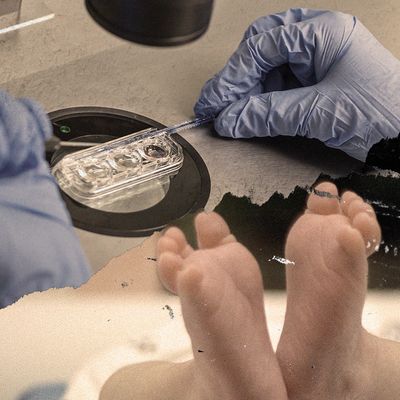IVF On Hold
COVID-19 stopped fertility treatments, leaving patients to wonder which will expire first: the restrictions or their own biological clocks.

It was the second week of March and Emily Robichaud was about to start her third round of in vitro fertilization when her doctor at Brigham and Women’s Hospital in Boston called to tell her it couldn’t happen. Fertility treatments were being put on hold because of the coronavirus.
“I got it, I understood, but if there was a way to continue my cycle I’d still want to go through with it,” says Robichaud, a retail manager who married at 36 and had to undergo surgery to remove uterine fibroids before starting IVF at 38. “My biggest issue is that I’m 39 ½ and it looks like [the coronavirus] is not going to clear up anytime soon. I think for all women it’s tough, but especially for older women. We’re working against time.”
By the following week, most fertility clinics across the U.S. had followed suit, cancelling all new treatment cycles, in accordance with guidance released by the American Society for Reproductive Medicine (ASRM) on March 17. The organization advised its more than 8,000 members to suspend all new treatment cycles of IVF, IUI, and egg freezing. It also recommended that clinics consider cancelling all embryo transfers, non-emergency surgeries, and diagnostic procedures, citing the public health emergency and the very limited data on COVID-19’s impact on pregnancy, especially in the first trimester. The unknown risks of COVID-19 on pregnancy has given some fertility specialists pause, especially the possibility that it might result in miscarriage or complications for a pregnancy that had taken years to achieve.
The guidelines (which ASRM revisited on March 30 with no changes) include a few exceptions: women who were mid-cycle and had already taken ovarian-stimulating drugs should be allowed to finish; cases of extreme urgency—such as freezing the eggs of a woman scheduled to undergo chemotherapy—also qualified. Advanced maternal age, however, did not.
“I keep hearing that it’s not life or death, but for us it kind of is—it’s the difference between a living child or not.”
“The guidelines were purposely timestamped to alleviate some of the stress that comes with uncertainty. The idea is that we’ll meet regularly to reassess the situation,” says Jennifer Kawwass, M.D., medical director at Emory University Reproductive Center and a member of ASRM’s COVID-19 task force. “The intent is not for this to last for very long, if we can help it. The idea is to slow the curve, not to halt all fertility treatments until there is no more coronavirus in the U.S.”
Unfortunately, the health crisis has only become more acute in the last two weeks. And for women who have already been waiting years to get pregnant, being asked to postpone treatments indefinitely can feel agonizing, especially knowing that their bodies or insurance benefits may not be the same when the wait is up. Insurance companies often impose additional requirements on women over 40, and may refuse to pay for treatment if they deem a patient’s chances too bleak.
Amy Schmidt Zook, a 43-year-old ER doctor who lives in Fort Worth, Texas, with her husband and two children, underwent an egg retrieval two days before the new protocols went into effect. One embryo from that retrieval is viable and will be frozen until embryo transfers resume.
Get exclusive access to fashion and beauty trends, hot-off-the-press celebrity news, and more.
“I keep hearing that it’s not life or death, but for us it kind of is—it’s the difference between a living child or not,” she says. “It feels like another thing that’s being taken away. At 43, the egg curve for having anything viable is a steep cliff. A month or two can make a huge difference. There are some clinics that, with my numbers, wouldn’t treat me.”
“They haven’t said anything about restricting pregnancies,” Zook adds. “They haven’t asked anyone else to curb their reproductive practices, but for infertile people, it’s keep your head down and be good soldiers.”

Many other women struggling with infertility also take issue with the fact that there is no general advisement against becoming pregnant and no evidence that pregnant women are more susceptible to COVID-19. The extremely limited data currently available indicates that the disease is not likely transmitted in utero, during labor, or via breastfeeding. Indeed, there has been a great deal of speculation that shelter in place orders will lead to a baby boom—salt in the wound for women forced to suspend treatment.
Among those who disagree with the guidelines is Beverly Reed, M.D., a fertility doctor at IVFMD, near Dallas, who has created a petition asking ASRM to change them. As of April 8, it has more than 13,900 signatories.
A self-proclaimed “rule follower,” Reed immediately started calling patients to cancel treatments, but during those calls, she began to reconsider. “They had a lot of good questions,” she says. “One woman said ‘Is this because coronavirus causes birth defects?’ And I said, ‘Actually no. The evidence is that it doesn’t.’ And she said, ‘Are all women being told not to get pregnant?’ And I said ‘No.’ And she said, ‘Well, then, why me?’ ”
“And then I saw the spring break coverage on the beach and I got so angry,” Reed continues. “I saw they were [ignoring social distancing guidelines] and I can’t even give the most basic treatments to my patients?”
She said, ‘Are all women being told not to get pregnant?’ And I said ‘No.’ And she said, ‘Well, then, why me?’
Reed wants the ASRM to give doctors more leeway to consider individual cases and circumstances. Though clinics are under no obligation to follow the guidelines, she argued that few doctors, herself included, are comfortable flouting the society’s recommendations.
“I do think we have very mixed feelings as providers—this is the reason we went into medicine: to help women, specifically, to help women become pregnant,” says Pei-Li Huang, M.D., a partner and founder at Fertility Solutions in New England. “A friend of mine said, ‘It’s sad to think of the babies not born because people couldn’t access reproductive medicine at this time.’ ”
Lucky Sekhon, M.D. a reproductive endocrinologist and infertility specialist at Reproductive Medicine Associates of New York, says she agreed with the guidelines, but “I feel horrible for our patients.”
“I understand the gravity of what’s happening in our New York City hospitals—we’re about to reach a critical shortage in doctors and nurses and everything has to go toward that effort,” she says. “But I don’t view infertility as elective. I think people are getting elective mixed up with vital. Giving women the opportunity to get pregnant is a priority. It’s just not vital at the early stages of this crisis.”
Even for women who fully agree with the suspension, it’s no less painful. One patient in the Boston area who, on her doctor’s advice, voluntarily agreed to delay an embryo transfer she was already taking medication for, is struggling with the lack of light at the end of the tunnel.
“I was at the hospital right before all this happened, and the tents were up, so I understand,” she says. “But it’s a really hard thing. You come this far and you don’t know when it will be over.”
For more stories like this, including celebrity news, beauty and fashion advice, savvy political commentary, and fascinating features, sign up for the Marie Claire newsletter.
RELATED STORY
